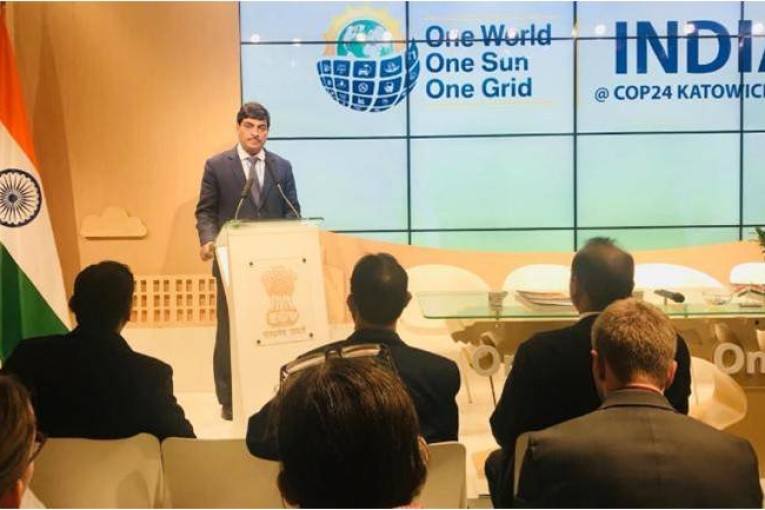

Two-week long negotiations on climate change, also called COP-24, concluded on late Saturday night of December 15 in the city of Katowice in Poland, wherein nearly 200 countries had assembled, while delivering a milestone rule book for the Paris climate treaty, but failing to dial up national efforts to slash carbon emissions. The Paris Agreement on Climate Change (PACC), which will start getting implemented from 2020, replacing the existing Kyoto Protocol, seeks to keep the rise in global average temperatures to well below 2 degree Celsius from pre-industrial levels.The finalization of the rulebook for implementing the PACC was the main agenda of the COP-24 and it received a mixed response from governments and observers.
India has actively participated in the COP-24 negotiations. On December 4, 2018, India circulated a paper titled “3 Essential “S” s of Climate Finance — Scope, Scale and Speed: A Reflection” on the sidelines of COP 24, which questioned climate finance values being reported by the developed countries as having been transferred by them to developing countries.The paper also said definitions of climate change finance used in various reports by developed countries were not consistent with the provisions of United Nations Framework Convention on Climate Change (UNFCCC).
During the critical phase of negotiations on December 12, India asserted that the PACC was ‘non-negotiable’ and there could be no compromise on the basic principles such as equity and Common but Differentiated Responsibilities and Respective Capabilities (CBDR-RC). India’s statement was made by AK Mehta, Additional Secretary, Ministry of Environment, Forests and Climate Change, on behalf of Environment Minister Harsh Vardhan late December 12 night.
India’s statement came in the wake of a move by the developed countries, led by the US and the EU, to dilute CBDR-RC, a principle within the UNFCCC that acknowledges the different capabilities and differing responsibilities of individual countries in addressing climate change. The developed countries’ move was strongly resisted by India and other developing countries, citing the historical responsibility of the developed nations in emitting carbon dioxide, contributing to global warming.
While agreeing that the PACC is non-negotiable and that the delicate balance reached between developed and developing countries must be retained, India also insisted that the outcome of the Katowice COP-24 should be inclusive, consensus based and an integrated package, including all the components of the Paris Agreement Work Programme, to reflect the global consensus reached at Paris in 2015. India’s statement further added: “Most importantly, we must stand with the poor, marginalized and vulnerable communities who would be most impacted by climate change to show that ‘WE CARE'”.While emphasizing that it was time to focus on finding common grounds and supporting each other, based on the principles of equity and climate justice, so that “no one is left behind”, India’s statement also noted: “It is important to ensure equitable access to global commons for all. The Paris Agreement signifies progress towards enhanced implementation of the Convention. While we do so, we have to maintain continuity in action by fulfilling pre-2020 commitments.”
Reiterating India’s stand to continue to take stock of pre-2020 action and ambition next year as well, the statement said:“We expect that developed countries shall honour their pre-2020 commitments so that no undue burden is shifted to the post-2020 period. We also look forward to see the Doha Amendment coming into force as soon as possible,” Taking note of the fact that the vulnerable populations are the worst hit by extreme weather events due to a lack of resources to cope with them, India’s statement added that the IPCC’s latest report on global warming “enjoins upon us to collectively address the issues of climate change with the urgency that it deserves.”
While taking part at the crucial stage of negotiations on the Rulebook for Paris Agreement on December 12, India’s lead negotiator Ravi Shankar Prasad said: “India wishes to express its strong reservation regarding the treatment of equity in the global stock-take decision. Equity is specifically mentioned in Article 14 of the Paris Agreement. It is the basic principle of the UN Framework Convention on Climate Change and the Paris Agreement along with the common but differentiated responsibilities.” Cautioning that the entire global stock-take exercise would be lopsided if the process, input, the technical assessment and output of the global stock-take did not fully address equity.
The curtains were drawn on COP-24 with the 133-page Paris rulebook being unanimously adopted in the Polish city of Katowice.



